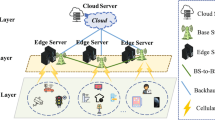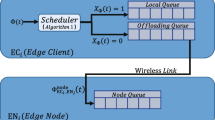Abstract
Mobile edge computing provides a new solution to meet the computing demands of emerging applications such as the industrial Internet, which cannot be fully met by the resources on the device side. However, the edge nodes and transmission channels are not always completely reliable. When the network channel is unreliable, it is easy to cause task transmission failure and lower service quality. In this paper, an optimized task offloading strategy based on deep reinforcement learning combined with channel reliability prediction is proposed, named deep deterministic policy gradient-based strategy combined with hindsight experience replay and LSTM (HL-DDPG). The HL-DDPG strategy uses long short-term memory (LSTM) to mine the time dependence between the channel reliability states. The task offloading is then modeled using the Markov decision process (MDP), and the joint optimization problem is solved using the DRL method based on the Actor-Critic framework. Meanwhile, Hindsight experience replay (HER) is used to improve the learning ability of the algorithm. The experimental results show that compared with four baseline algorithms, HL-DDPG has a lower overall offloading error probability and a lower task timeout rate, which effectively improves the reliability of the edge offloading system and reduces the risk of task transmission failure.











Similar content being viewed by others
Explore related subjects
Discover the latest articles and news from researchers in related subjects, suggested using machine learning.References
Deng, X., Yin, J., Guan, P., Xiong, N. N., Zhang, L., & Mumtaz, S. (2021). Intelligent delay-aware partial computing task offloading for multi-user industrial Internet of Things through edge computing. IEEE Internet of Things Journal, 10(4), 2954–2966.
Zhou, H., Jiang, K., Liu, X., Li, X., & Leung, V. C. (2021). Deep reinforcement learning for energy-efficient computation offloading in mobile-edge computing. IEEE Internet of Things Journal, 9(2), 1517–1530.
Tu, Y., Chen, H., Yan, L., & Zhou, X. (2022). Task offloading based on LSTM prediction and deep reinforcement learning for efficient edge computing in IoT. Future Internet, 14(2), 30.
Gong, H., Ge, H., Ma, S., Sun, A., Chen, X., & Liu, L. (2022, March). Task Offloading Strategy Based on TD3 Algorithm in Cloud-Edge Collaborative MEC. In: 2022 4th International Conference on Natural Language Processing (ICNLP) (pp. 452–459). IEEE
Shinde, S. S., & Tarchi, D. (2023). A Markov Decision Process Solution for Energy-Saving Network Selection and Computation Offloading in Vehicular Networks. IEEE Transactions on Vehicular Technology.
Ladosz, P., Weng, L., Kim, M., & Oh, H. (2022). Exploration in deep reinforcement learning: A survey. Information Fusion, 85, 1–22.
Li, H., Wei, T., Ren, A., Zhu, Q., & Wang, Y. (2017, November). Deep reinforcement learning: Framework, applications, and embedded implementations. In: 2017 IEEE/ACM International Conference on Computer-Aided Design (ICCAD) (pp. 847–854). IEEE
Alam, M. G. R., Hassan, M. M., Uddin, M. Z., Almogren, A., & Fortino, G. (2019). Autonomic computation offloading in mobile edge for IoT applications. Future Generation Computer Systems, 90, 149–157.
Qian, Y., Hu, L., Chen, J., Guan, X., Hassan, M. M., & Alelaiwi, A. (2019). Privacy-aware service placement for mobile edge computing via federated learning. Information Sciences, 505, 562–570.
Wang, T., Liang, Y., Zhang, Y., Zheng, X., Arif, M., Wang, J., & Jin, Q. (2020). An intelligent dynamic offloading from cloud to edge for smart iot systems with big data. IEEE Transactions on Network Science and Engineering, 7(4), 2598–2607.
Wang, S., Chen, M., Yin, C., Saad, W., Hong, C. S., Cui, S., & Poor, H. V. (2021). Federated learning for task and resource allocation in wireless high-altitude balloon networks. IEEE Internet of Things Journal, 8(24), 17460–17475.
Liu, X., Jiang, J., & Li, L. (2021, October). Computation Offloading and Task Scheduling with Fault-Tolerance for Minimizing Redundancy in Edge Computing. In: 2021 IEEE International Symposium on Software Reliability Engineering Workshops (ISSREW) (pp. 198–209). IEEE.
Min, M., Xiao, L., Chen, Y., Cheng, P., Wu, D., & Zhuang, W. (2019). Learning-based computation offloading for IoT devices with energy harvesting. IEEE Transactions on Vehicular Technology, 68(2), 1930–1941.
Bian, Yuwei, et al. Dependency-Aware Task Scheduling and Offloading Scheme based on Graph Neural Network For MEC-Assisted Network. In: 2023 IEEE/CIC International Conference on Communications in China (ICCC Workshops). IEEE, 2023.
Gu, L., & Mohajer, A. (2024). Joint throughput maximization, interference cancellation, and power efficiency for multi-IRS-empowered UAV communications. Signal, Image and Video Processing, 18(5), 4029–4043.
Liu, W., Li, B., Xie, W., et al. (2023). Energy efficient computation offloading in aerial edge networks with multi-agent cooperation[J]. IEEE Transactions on Wireless Communications, 22, 5725–5739.
Pu, X., Lei, T., Wen, W., et al. (2023). Incentive mechanism and resource allocation for collaborative task offloading in energy-efficient mobile edge computing[J]. IEEE Transactions on Vehicular Technology, 72, 13775–13780.
Wu, G., Xu, Z., Zhang, H., et al. (2023). Multi-agent DRL for joint completion delay and energy consumption with queuing theory in MEC-based IIoT[J]. Journal of Parallel and Distributed Computing, 176, 80–94.
Wang, Q., Li, W., & Mohajer, A. (2024). Load-aware continuous-time optimization for multi-agent systems: Toward dynamic resource allocation and real-time adaptability. Computer Networks, 250, 110526.
Yang, T., Sun, J., & Mohajer, A. (2024). Queue stability and dynamic throughput maximization in multi-agent heterogeneous wireless networks. Wireless Networks, 30, 1–27.
Liu, C. F., Bennis, M., Debbah, M., & Poor, H. V. (2019). Dynamic task offloading and resource allocation for ultra-reliable low-latency edge computing. IEEE Transactions on Communications, 67(6), 4132–4150.
Merluzzi, M., di Pietro, N., Di Lorenzo, P., Strinati, E. C., & Barbarossa, S. (2019, December). Network energy efficient mobile edge computing with reliability guarantees. In: 2019 IEEE Global Communications Conference (GLOBECOM) (pp. 1–6). IEEE.
Dong, L., Wu, W., Guo, Q., Satpute, M. N., Znati, T., & Du, D. Z. (2019). Reliability-aware offloading and allocation in multilevel edge computing system. IEEE Transactions on Reliability, 70(1), 200–211.
Wu, H. (2018). Performance modeling of delayed offloading in mobile wireless environments with failures [J]. IEEE Communications Letters, 22(11), 2334–2337.
Tang, W., Gao, D., Siyu, Yu., Jianbo, Lu., Wei, Z., Li, Z., & Chen, N. (2024). Reliable and adaptive computation offload strategy with load and cost coordination for edge computing. Pervasive and Mobile Computing, 102, 101932.
Wenxiu, Xu., Yin, Y., Chen, N., & Huan, Tu. (2023). Collaborative inference acceleration integrating DNN partitioning and task offloading in mobile edge computing. International Journal of Software Engineering and Knowledge Engineering, 33(11&12), 1835–1863.
Wang, J., Liu, K., Li, B., Liu, T., Li, R., & Han, Z. (2019). Delay-sensitive multi-period computation offloading with reliability guarantees in fog networks. IEEE Transactions on Mobile Computing, 19(9), 2062–2075.
Sadek, A. K., Han, Z., & Liu, K. R. (2009). Distributed relay-assignment protocols for coverage expansion in cooperative wireless networks. IEEE Transactions on Mobile Computing, 9(4), 505–515.
Hazarika, B., Singh, K., Biswas, S., & Li, C. P. (2022). DRL-based resource allocation for computation offloading in IoV networks. IEEE Transactions on Industrial Informatics, 18(11), 8027–8038.
You, C., Huang, K., Chae, H., & Kim, B. H. (2016). Energy-efficient resource allocation for mobile-edge computation offloading. IEEE Transactions on Wireless Communications, 16(3), 1397–1411.
Tang, M., & Wong, V. W. (2020). Deep reinforcement learning for task offloading in mobile edge computing systems. IEEE Transactions on Mobile Computing, 21(6), 1985–1997.
Chen, X., Ge, H., Liu, L., Li, S., Han, J., & Gong, H. (2021, April). Computing offloading decision based on DDPG algorithm in mobile edge computing. In: 2021 IEEE 6th International Conference on Cloud Computing and Big Data Analytics (ICCCBDA) (pp. 391–399). IEEE
Funding
This study was funded by the National Natural Science Foundation of China (No.62162003). This study was funded by the Nanning Science and Technology project (No. 20221031).
Author information
Authors and Affiliations
Corresponding author
Ethics declarations
Conflict of interest
Author Weicheng Tang declares that he has no conflict of interest. Author Yubin Yang declares that he has no conflict of interest. Author Donghui Gao declares that he has no conflict of interest. Author Juan Chen declares that he has no conflict of interest. Author Suqun Huang declares that he has no conflict of interest. Author Ningjiang Chen declares that he has no conflict of interest.
Ethical approval
This article does not contain any studies with human participants or animals performed by any of the authors.
Additional information
Publisher's Note
Springer Nature remains neutral with regard to jurisdictional claims in published maps and institutional affiliations.
Rights and permissions
Springer Nature or its licensor (e.g. a society or other partner) holds exclusive rights to this article under a publishing agreement with the author(s) or other rightsholder(s); author self-archiving of the accepted manuscript version of this article is solely governed by the terms of such publishing agreement and applicable law.
About this article
Cite this article
Tang, W., Yang, Y., Gao, D. et al. An optimized task offloading strategy based on deep reinforcement learning combined with channel reliability prediction. Wireless Netw 31, 1663–1682 (2025). https://doi.org/10.1007/s11276-024-03838-7
Accepted:
Published:
Issue Date:
DOI: https://doi.org/10.1007/s11276-024-03838-7




